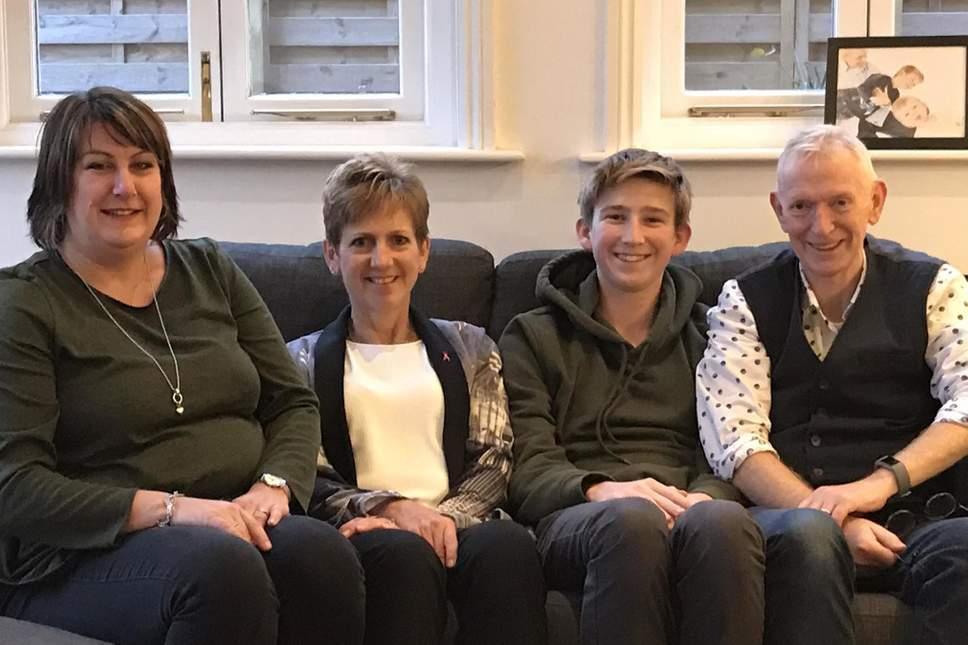AIDSfree: ‘After HIV diagnosis, being able to have a family was a gift from God’
Country’s first clinic allowing HIV-positive men to father babies was opened in London in the 1990s

Your support helps us to tell the story
From reproductive rights to climate change to Big Tech, The Independent is on the ground when the story is developing. Whether it's investigating the financials of Elon Musk's pro-Trump PAC or producing our latest documentary, 'The A Word', which shines a light on the American women fighting for reproductive rights, we know how important it is to parse out the facts from the messaging.
At such a critical moment in US history, we need reporters on the ground. Your donation allows us to keep sending journalists to speak to both sides of the story.
The Independent is trusted by Americans across the entire political spectrum. And unlike many other quality news outlets, we choose not to lock Americans out of our reporting and analysis with paywalls. We believe quality journalism should be available to everyone, paid for by those who can afford it.
Your support makes all the difference.Perry Evans feared he would never have a family after he contracted HIV through infected blood in a transfusion. But through a revolutionary process known as “sperm washing” he was able to father two children without passing the virus on.
The news was broken to him in 1985, when he was just 23, and he was told he had two to three years left to live.
“I was quite numb when I was told,” said Mr Evans, who suffers from haemophilia, a condition that stops the blood clotting. “At the time, I was quite healthy and active. I had just finished my degree. I was young, free and single. My life was just starting.”
Two years after his diagnosis, he met a woman called Heather whom he married a year later. “Heather went into our marriage thinking I would soon die and knowing we couldn’t have kids,” Mr Evans said. “Friends of ours were starting families and I felt like a part of life had been taken away from me.”
But in 1999, three years after the introduction of effective HIV treatment, the future began to look very different.
Carole Gilling-Smith, a gynaecologist and fertility specialist, set up the sperm washing programme at Chelsea and Westminster Hospital, giving men diagnosed with HIV in the UK a chance at becoming parents without infecting their partner or child.
Initially the treatment was available only on a paid-for basis at the hospital, and was offered on the NHS soon after.
In 2001 Mr Evans’s son Isaac was born. The IT worker said: “It was like a gift from God. At that point I was thinking I shouldn’t be here and I most certainly shouldn’t have a child.”
The couple’s daughter Cerian was also born through sperm washing at the clinic in 2005.
Dr Gilling-Smith said: “HIV would not attach itself to sperm, it was found in the fluid surrounding sperm. By processing the sperm we could separate it from the contaminated fluid. We could then inseminate that sperm in a women’s uterus and she would not get infected.”
The technique was developed in Milan nine years earlier, but it was undertaken in Britain only after doctors at Chelsea and Westminster had concluded a year-long study.
Dr Gilling-Smith said the clinic experienced a drop in referrals around 2008 as HIV treatments had evolved to such a degree that the virus in the bloodstream was becoming undetectable, meaning it was untransmittable.
The team also started a women’s programme in 2002, in which they would help women get pregnant if they were HIV positive and their partner was negative. They were taught how to self-inseminate using their partner’s sperm or they would be put on IVF.
Dr Gilling-Smith, who now runs her own assisted conception clinic in Brighton, said her patients included doctors and nurses who had acquired HIV through work.
She added: “We were able to change lives. It gave HIV-positive people a chance at leading a normal life, becoming parents, perhaps even grandparents in the future.
“When you are told you are HIV positive, for a lot of these people they think they are going to die. So witnessing their child being born, seeing a part of you live on is a really important thing.”
Mr Evans, who was living in Watford when his children were born but has since moved to Winchester, Hampshire, said: “I suffer from a lot of colds, infections and pneumonias. I am unfortunately living with a body that has been scarred and it’s done irreplaceable damage. But I choose not to live in the past. I had two amazing kids, whom I love very much and who are my inspiration, so I feel very lucky.”
Join our commenting forum
Join thought-provoking conversations, follow other Independent readers and see their replies
Comments